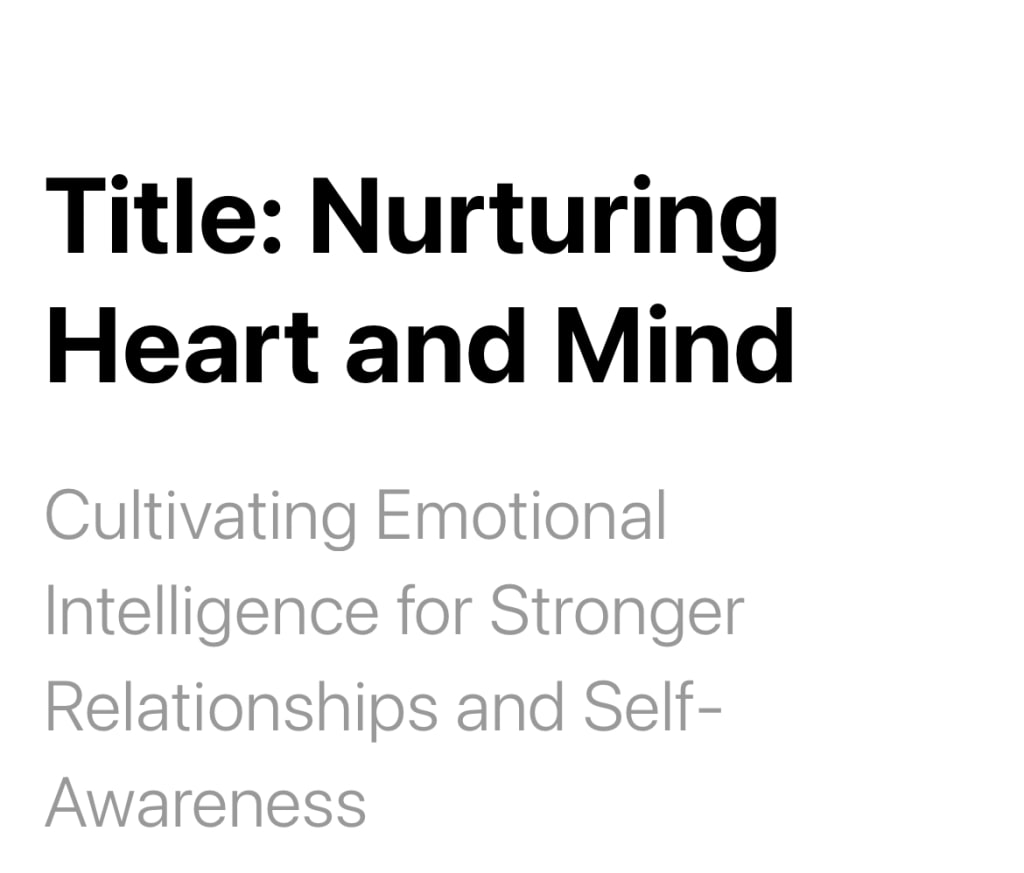Title: Nurturing Heart and Mind
Cultivating Emotional Intelligence for Stronger Relationships and Self-Awareness

Introduction:
In the intricate tapestry of human interactions, emotional intelligence acts as the guiding thread that weaves our connections. The ability to understand and manage emotions, both in ourselves and others, forms the foundation of healthy relationships and personal growth. In this article, we embark on a journey to explore the art of cultivating emotional intelligence, delving into its importance, benefits, and practical strategies for enhancing self-awareness and building stronger, more meaningful relationships.
The Power of Emotional Intelligence:
Emotional intelligence is the cornerstone of effective communication, empathy, and self-awareness. It encompasses the ability to recognize and understand our emotions, navigate them appropriately, and perceive and respond to the emotions of those around us. By cultivating emotional intelligence, we empower ourselves to forge deeper connections, resolve conflicts harmoniously, and navigate the intricate landscape of human emotions.
Enhancing Self-Awareness:
Self-awareness is the bedrock upon which emotional intelligence is built. By developing a keen sense of self-awareness, we gain insights into our own emotions, triggers, and patterns of behavior. This self-reflection enables us to recognize our strengths, weaknesses, and areas for growth. By accepting ourselves with compassion and authenticity, we create a solid foundation for developing emotional intelligence.
Practical Strategies for Cultivating Emotional Intelligence:
Recognize and Label Emotions
Start by paying attention to your own emotions. Pause and reflect on what you're feeling, and then label those emotions. This simple act of recognition enhances self-awareness and lays the groundwork for effectively managing and expressing emotions.
Practice Empathy
Empathy is the ability to understand and share the feelings of another person. Cultivate empathy by actively listening to others, seeking to understand their perspectives, and validating their emotions. Engaging in acts of kindness and compassion further deepens our capacity for empathy.
Develop Emotional Regulation
Emotional regulation involves managing and expressing emotions in a healthy and constructive manner. This can be achieved through various techniques such as deep breathing, mindfulness, journaling, or seeking support from trusted friends or professionals. By acknowledging and regulating our emotions, we foster better self-control and reduce the risk of impulsive reactions.
Enhance Social Awareness
Social awareness involves being attuned to the emotions and needs of others. Practice active listening, observe non-verbal cues, and strive to understand different cultural and social contexts. By developing a keen social awareness, we can navigate relationships with sensitivity and respect.
Communicate Effectively
Effective communication is the bridge that connects emotional intelligence with interpersonal relationships. Practice open and honest communication, expressing your emotions and needs clearly while listening attentively to others. Strive for assertiveness and empathy in your interactions, fostering a safe and supportive environment for open dialogue.
Benefits of Emotional Intelligence:
Cultivating emotional intelligence yields numerous benefits, both in our personal and professional lives. Here are some key advantages:
Improved Relationships
Emotional intelligence fosters stronger and more authentic connections, as we are better equipped to understand and respond to the emotions of others. By fostering empathy and effective communication, we build trust and harmony within our relationships.
Conflict Resolution
Emotional intelligence equips us with the skills needed to navigate conflicts constructively. By managing our own emotions and understanding the emotions of others, we can defuse tension, find common ground, and seek mutually beneficial solutions.
Enhanced Well-Being
Emotional intelligence contributes to greater self-awareness and emotional well-being. By recognizing and regulating our emotions, we reduce stress, enhance resilience, and cultivate a positive mindset. This leads to increased overall satisfaction and a greater sense of fulfillment.
Success in Leadership Roles
Emotional intelligence is a hallmark of effective leadership. Leaders who possess emotional intelligence are adept at motivating and inspiring others, building cohesive teams, and managing conflicts. By cultivating emotional intelligence, we enhance our leadership skills and increase our chances of success in professional settings.
Conclusion
Cultivating emotional intelligence is an ongoing journey of self-discovery and growth. By nurturing self-awareness, practicing empathy, and developing emotional regulation, we empower ourselves to build stronger relationships, communicate effectively, and navigate the complexities of human emotions. As we embark on this transformative path, we create a ripple effect that extends beyond ourselves, fostering a more harmonious and empathetic world. Embrace the power of emotional intelligence, and watch as your relationships flourish and your self-awareness deepens, leading you towards a more fulfilling and emotionally intelligent life.





Comments
There are no comments for this story
Be the first to respond and start the conversation.